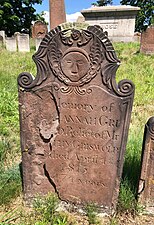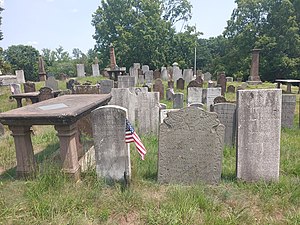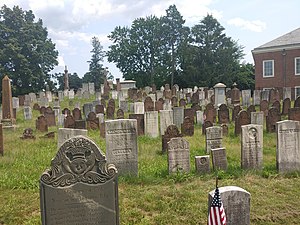Old Wethersfield Village Cemetery
| Old Wethersfield Village Cemetery | |
|---|---|
 | |
 | |
| Details | |
| Established | 1638 |
| Location | 1 Marsh St., Wethersfield, Connecticut |
| Coordinates | 41°42′45″N 72°38′6″W / 41.71250°N 72.63500°W |
The Wethersfield Village Cemetery is a historic burying ground in Wethersfield Connecticut that was started in 1638, and is the second oldest burial ground in Connecticut.
History[edit]
The burying ground was established by the town of Wethersfield on Hungry Hill in 1638. As was the custom during the colonial period, burial plots were free of charge and were permitted wherever there was room.[1] Though the burial ground was in use in the 17th century, very few markers from that period survived the centuries. This is likely because the earliest stones were made of wood or primitive fieldstones that deteriorated over time. With no local carvers, the cost of a grave marker to be bought and shipped made it a luxury for only the wealthiest families.[1] Only three markers from the 17th century survive today.
In the 18th century, gravestones became more widely available, particularly those imported from the Portland, Bolton, and Manchester regions. Carvers who carved on Connecticut River Valley brownstone were especially popular and included the Stanclift family of Middletown, The Thomas Johnsons of Chatham, Peter and William Buckland of Manchester, Charles Doplph of Killingworth, and the Unknown Glastonbury Lady Carver. Many markers are also made from grey granite schist including those carved by Gershom Bartlett of Bolton, Peter Buckland of Manchester, Daniel Ritter of East Hartford, Josiah Manning of Windham, and Aaron Haskins of Bolton. A small number of slate markers, most featuring deaths head designs were also shipped in from the Boston region. In the 1790s, Samuel Galpin moved to Wethersfield and became the town's first grave carver. He was very popular in Wethersfield and the surrounding areas and carved many tombstones from Portland sourced brownstone in the first few decades of the 19th century.[2]
Gallery[edit]
-
Brownstone marker of Armiger Leonard Chester dated 1648
-
Brownstone Markers from the 1710s carved by the Stanclift Family of Portland
-
A deaths head winged skull maker dated 1729 and carved by Thomas Johnson Sr. of Cromwell
-
An elaborate schist gravestone carved by Gershom Bartlett of Bolton.
-
A marker dated 1775 carved by Peter Buckland of Manchester, made of brick red brownstone from the Buckland Quarry in Manchester.
-
A schist marker carved by Josiah Manning of Windham.
-
A late brownstone marker dated 1815 carved by Samuel Galpin of Wethersfield.design.
-
Overlooking a number of brownstone and schist markers
-
Looking over old grave markers
-
View of gravestones and brownstone table marker
-
Looking over the rear burying ground
References[edit]
- ^ a b "History Of Ancient Burying Ground And Village Cemetery". Wethersfield Historical Society.
- ^ "The Great River: Art & Society of the Connecticut Valley, 1635-1820".
Sources[edit]
- Slater, James A. (1987). The Colonial Burying Grounds of Connecticut and the Men Who Made Them (1st ed.). Hamden, Connecticut: Archon Books.
- Hosley, W. N. (1985). The Great River: Art & Society of the Connecticut Valley, 1635-1820 (1st ed.). Hartford, Connecticut: Wadsworth Atheneum.
- Forbes, H.M. (1927). Gravestones of Early New England and the Men Who Made Them 1653-1800 (1967 reprint ed.). New York: Da Capo Press. ISBN 9781625851963. LCCN 67027452.











